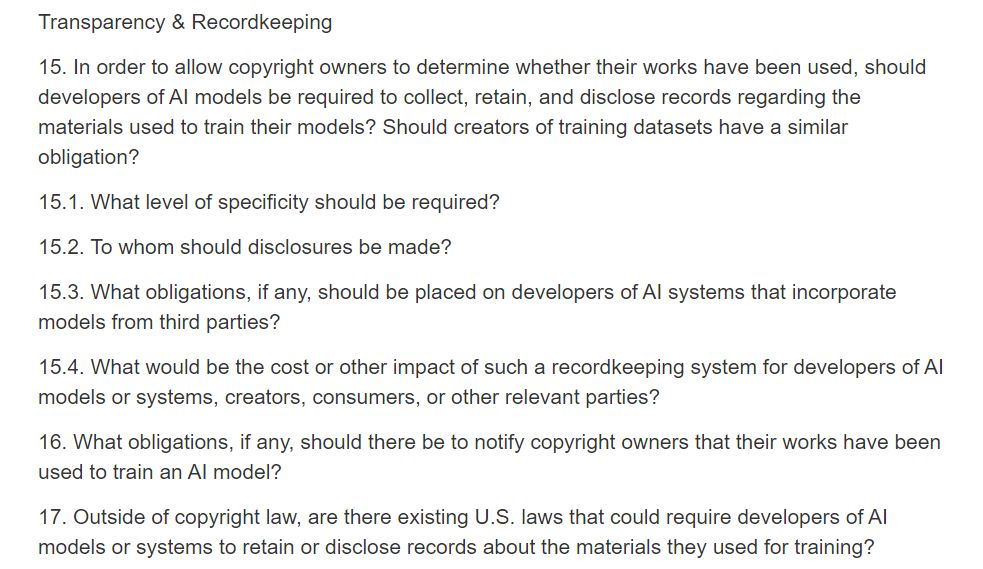 History has shown that copyright holders tend to be wary of new technologies that disrupt the status quo.
History has shown that copyright holders tend to be wary of new technologies that disrupt the status quo.
From the printing press, through cassette tapes, to online video streaming services, all were seen as major threats to the revenues of copyright holders at some point.
These weren't just overblown fears, since technologies can be used for both good and bad. Pirate streaming services are still a problem today, for example, but the same can't be said for Netflix and Spotify.
Over the past year, artificial intelligence has propelled itself to become a top concern for copyright holders. While this evolving technology can be a boon to rightsholders, the current focus is to prevent AI from exploiting, cannibalizing, or infringing copyrighted content.
The issue has already made its way to the courts in several instances and a few weeks ago we reported that anti-piracy groups are also getting involved. Last month, the Danish Rights Alliance was the first group to claim a major victory on the takedown front, by removing a copy of the controversial Books3 AI training dataset from the web.
The Books3 dataset has a clear piracy angle, as it was created from the library of 'pirate' site Bibliotik. The plaintext collection of 196,640 books, which is nearly 37GB in size, was used to train several AI models, including Meta's.
Books3 was first published on The Eye in late 2020 and was eventually removed when the Rights Alliance sent a formal takedown notice. There are still copies circulating elsewhere, but rightsholders are determined to take these down as well.
Transparency Needed
Many rightsholders believe that Books3 isn't the only piracy-sourced dataset. There are other book datasets as well, which are too large to have been created from public domain content. And then there are datasets that use copyrighted music, images, and video as well.
What makes Books3 unique is the fact that the source was published. In many other instances that's not the case, so rightsholders can't send takedown notices, even if they wanted to.
Rights Alliance director Maria Fredenslund notes that the Books3 example shows the importance of companies being transparent about the datasets they use to train AI models. This should be the rule going forward, not the exception.
"Books3 was a special case, as the creators of the data set had made public its origin, and at the same time, some artificial intelligence developers had indicated that they had used Books3. The case is therefore a real example of transparency being necessary for rights holders to enforce their content," Fredenslund says.
"We are therefore in the process of continuing our experience with Books3, in a call for a stricter requirement for transparency in the EU's AI Regulation, so that rights holders have a real opportunity to check whether their content is used to train artificial intelligence."
U.S. Copyright Office Asks Questions
The anti-piracy group isn't the only party focusing on transparency. The U.S. Copyright Office, which launched a broader AI initiative earlier this year, just launched a public consultation where it asks stakeholders for their views on the matter.
"In order to allow copyright owners to determine whether their works have been used, should developers of AI models be required to collect, retain, and disclose records regarding the materials used to train their models?" the Office asks.
"What obligations, if any, should there be to notify copyright owners that their works have been used to train an AI model?" another question reads.

UK House of Commons Committee Chimes In
Last week, a new AI report from the UK House of Commons Committee also chimed in on the subject. The government previously floated the idea of introducing a copyright exception for text and data mining for AI, but after objections, quickly walked it back.
The House of Commons Committee believes that this was wise, noting that rightsholders should be protected. Their report also recommends further transparency and the need for copyright holders to be compensated if their work is used for AI training purposes.
"The Government should consider how creatives can ensure transparency and, if necessary, recourse and redress if they suspect that AI developers are wrongfully using their works in AI development," the House of Commons Committee writes.
"The Government should support the continuance of a strong copyright regime in the UK and be clear that licenses are required to use copyrighted content in AI. In line with our previous work, this Committee also believes that the Government should act to ensure that creators are well rewarded in the copyright regime."
Just the Beginning
The European Union already has a transparency requirement in its recently proposed AI regulation but Rights Alliance doesn't believe it's helpful in its current form.
"[T]he EU's AI regulation is not sufficient, since this does not oblige the developers of artificial intelligence to publish where the content of their training data originates," the anti-piracy group notes.
These are just a few examples of recent AI-related copyright issues. While it's still early days, we can expect the topic to keep rightsholders, lawmakers, and courts busy for years.
Now is the time for various stakeholders to draw their lines in the sand. It's clear that AI development can't be slowed down, but which training data and outputs will be considered fair game is yet to be determined.
From: TF, for the latest news on copyright battles, piracy and more.
No comments:
Post a Comment